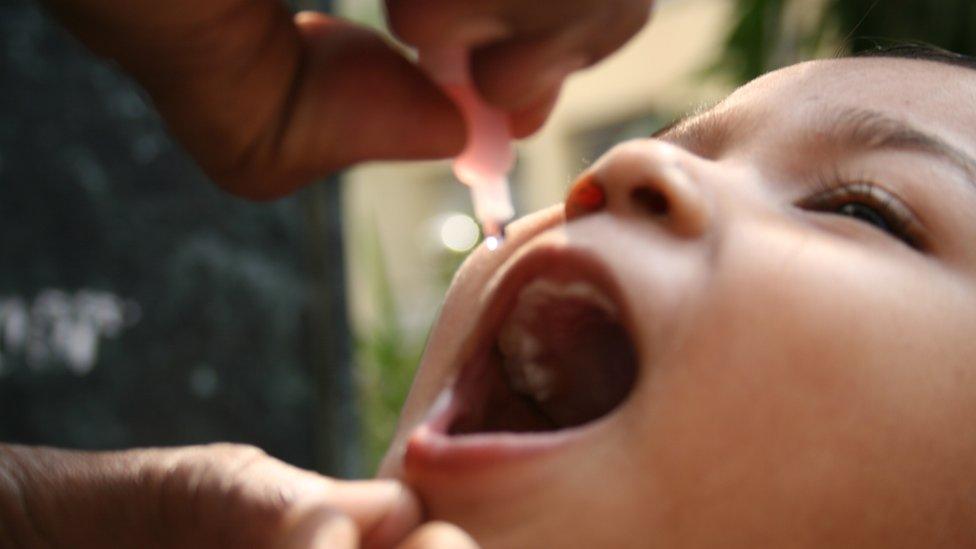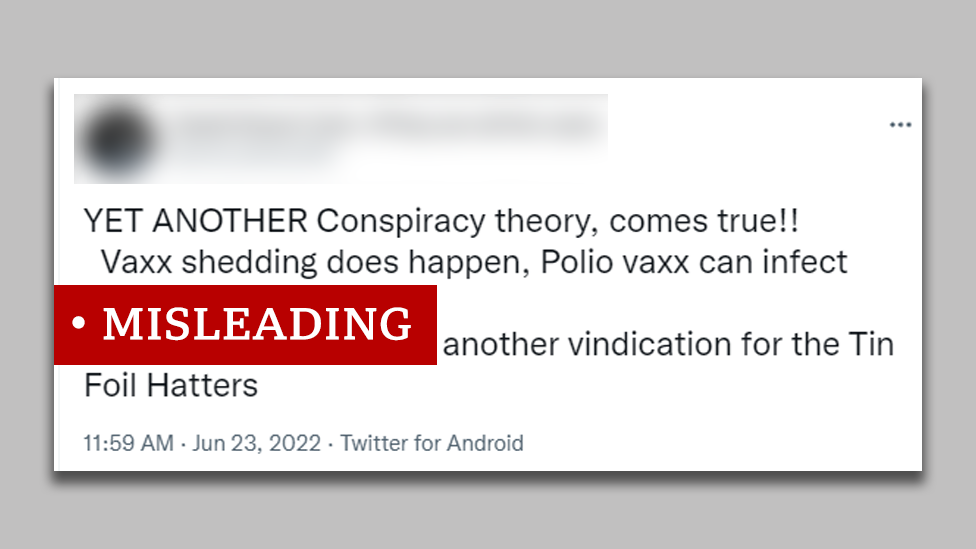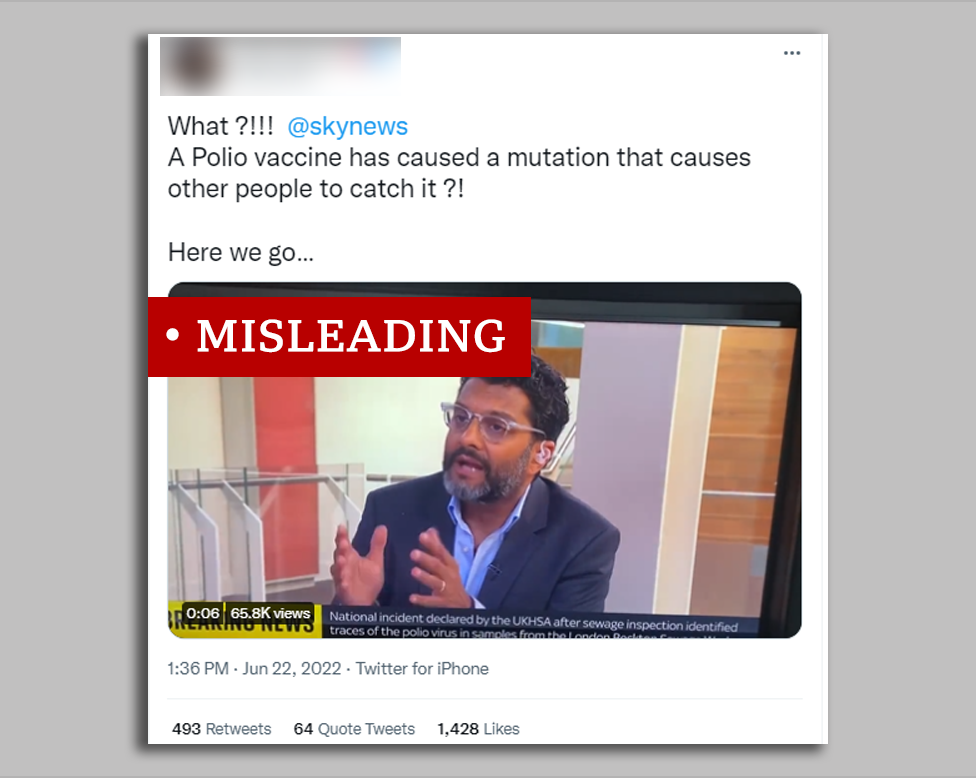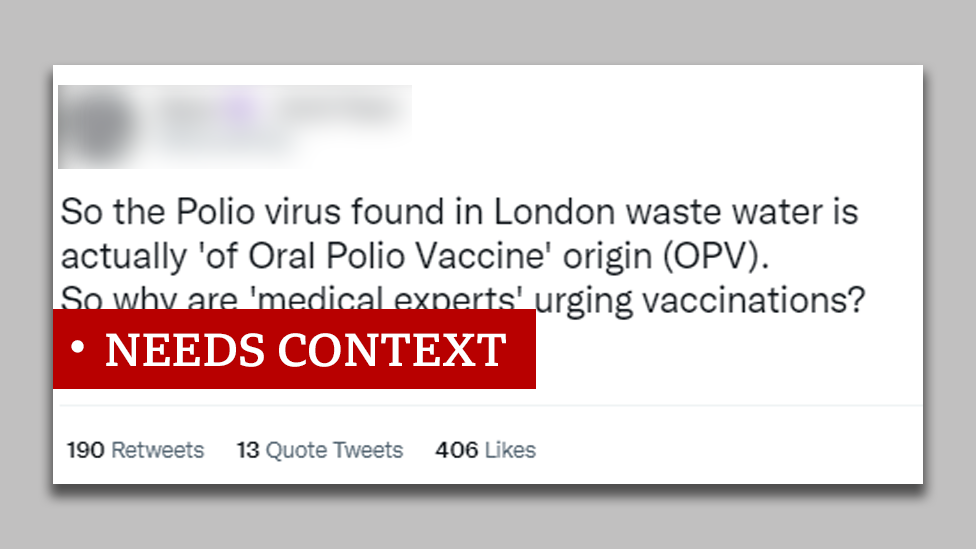Polio: Virus found in London prompts misleading vaccine claims
- Published

Claims are spreading online about what the detection of the polio virus in London sewage means.
Health officials believe the polio they found in sewage samples may have been brought to the UK by someone who was vaccinated abroad with a live form of the virus.
But misleading posts, shared on Twitter and on the encrypted messaging app Telegram, are suggesting that vaccines in general can cause disease outbreaks.
Many of these come from people who have been campaigning against Covid vaccines.
Here's what we do know.
Can vaccines "shed" and infect people?
There are different types of vaccine which are safe and highly effective at protecting people against polio.
The one currently given in the UK uses an inactivated or dead virus, meaning it cannot infect anyone or spread.
But some countries, which still have the virus in circulation, give people live oral polio vaccines (which the UK used in the past) because they are particularly useful in dealing with current outbreaks.
They contain a safe, weakened version of the polio virus. That does mean small traces of live virus can be shed from the gut of the person who has been vaccinated.
In rare cases, that can be passed on to others - although it shouldn't make them ill, particularly if they have already been vaccinated themselves, according to Prof Beate Kampmann, an immunologist and vaccine expert at the London School of Hygiene and Tropical Medicine.
It's estimated that 6.5 million children would have been paralysed by wild poliovirus in the last decade without the oral vaccine.
"One-off" traces of polio are spotted in sewage a handful of times a year, according to the UK Health Security Agency (UKHSA), and they don't normally need to be acted on.
In this latest UK situation though, the virus has been detected repeatedly over the course of a few months.
This suggests it has also been spreading between a few people, Prof Kampmann, says, but adds that none are known to have actually become ill.
A spokesperson for the World Health Organization's Global Polio Eradication Initiative (GPEI) said this shouldn't be described as an outbreak.
Renewed claims about Covid vaccines
As Covid-19 vaccines were rolled out, some groups began to spread the false belief that they could have a broad range of effects on unvaccinated people, in a process they described as "shedding", external.
Recent posts have tried to claim that this belief has been vindicated by the detection of polio shed by a vaccinated person.

None of the Covid vaccines contain live virus and, according to experts, there is no way any of them could shed or lead to health problems or changes in unvaccinated people.
Fact-checkers have suggested, external the rumour about Covid vaccine shedding may have started from a generic disclaimer within Pfizer's vaccine trial documents, external, which the company says is a "standard protocol measure" appearing on any drug trial in case it should contain a live component.
So the fact we are seeing so-called shedding from a live polio vaccine (a well-known phenomenon) doesn't prove those accounts were right about Covid vaccine shedding.
Did the polio vaccine cause a mutation?
Some posts have questioned why polio vaccines are being recommended as a solution to a problem they see as being caused by the vaccine - but that's not really the whole story.
"The vaccines do not cause mutations", says Prof Kampmann.
Instead, viruses mutate as they spread from person to person.
The weakened virus in the live vaccine is extremely unlikely to cause any problems. The concern is it might - over time as it is passed from person to person - become more like the original wild polio virus that causes disease.

But it is generally only in under-vaccinated populations that it spreads for long enough periods to evolve in worrying ways, Prof Paul Hunter, a public health and infectious diseases specialist at the University of East Anglia, explains.
With high vaccine coverage, the spread of live virus from a vaccine will relatively quickly "fizzle out without causing any harm," he says.
London has lower vaccination rates than the national average - especially in certain areas - and experts believe this may have allowed the weakened version of the virus from the vaccine to spread and evolve.
It doesn't seem to have caused illness in anyone so far, Prof Kampmann says.
She acknowledged it might be confusing to some people that a vaccine was the solution to tackling a strain of polio that came from a vaccine.

But, she emphasises, these vaccine-derived polio viruses "can only happen if there is poor immunity against polio in the community".
Remember, the jab given in the UK - which health leaders are recommending people check they are up-to-date with - is not live and cannot infect anyone.
The false claims about purging toxins
It's become a regular tactic from some accounts and social media groups to jump on any news of illness and link it to Covid vaccines.
One post suggested both the detection of polio and a monkeypox outbreak were actually, "the symptoms of detoxification as the body tries to purge the toxins" from the Covid vaccine.
Scientists have been able to test for and examine the genetic material of both polio and monkeypox - distinctive viruses which many decades of science have allowed researchers to become familiar with.
"These are definitely polioviruses, which have been around for millennia : nothing to do with Covid or Covid vaccines," a GPEI spokesperson said, and confirmed that there is no biological mechanism by which the Covid vaccines could be causing these completely different viruses.
Additional reporting by Shayan Sardarizadeh, BBC Monitoring